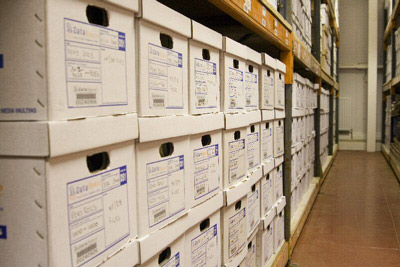How to Store Legal Documents Securely
- Details
- Published: Tuesday, 17 February 2015 17:28
- Written by Pearl Scan
- Hits: 4314

Legal documents contain a large amount of information and data that needs to be kept secure for clients' security but some law firms are failing without even realising it.
Paper. It's susceptible to damage in the form of rips, tears and discolouring. It's susceptible to theft and it's also pretty easy to lose. So why on earth do we still store our important documents in paper form?
A (Very) Short History of Paper
- It is thought that paper was invented in the 2nd century AD by the ancient Chinese and reached Europe as early as 1085.
- Although initially expensive, paper and it's production began to reduce in price by the early 13th century with experiments of different minerals and materials to produce the pulp needed for paper.
- By 1900 paper was used widely in developed countries for books, newspapers and writing materials.
Thus began our love of paper. With it's rich history and apparent all-round usefulness, it's not surprise that paper was the first port of call for storing important information. You could file it away, organise it how you liked and have a hard copy document in your hand when you needed information.
Of course, this was before the digital age came into play and rained on paper's parade...
Digital vs Paper
When computers were first introduced, it was still seen as the most efficient solution to store documents in paper copy in filing cabinets, boxes and folders. New technology was expensive and as people, we prefer to shy away from change. But advances in technology have meant that digital means are now overtaking our old paper favourites. Newspapers are more popular online, eBooks are flying off their virtual shelves and less and less people are sending post using envelopes and stamps preferring the instant nature of emailing.
What Does This Mean For Document Storage?
As I've already mentioned, storing paper documents leaves them open to being damaged, lost or stolen and with usually no backup documents, you can be left in quite a sticky situation. This is where law firms are turning to digital document storage for a safer, more secure and cost effective solution.
By digitising legal documents once kept in hard copy, they can secure information about clients through password protection and file encryption and backup files to avoid the loss of important documents.
The Security of Files Increases Greatly Through Digitisation
Although there will always be skeptics about the safety of digital documents, especially in the wake of recent hacking news, digital storage is still the safest solution when implemented correctly. Using strong passwords and secure shared networks will help to ensure your information doesn't get into the wrong hands.
Digitising Legal Documents
Here at Pearl Scan we specialise in document scanning for the legal sector with our bespoke legal document scanning and legal document management services. We have a top of the range, secure scanning bureau where we can scan legal documents in the highest quality, with a quick turnaround for a competitive price. If that's not enough, we can also offer a number of perks for choosing Pearl Scan's Legal Scanning Service;
- You will receive a free sample of some of your digital documents before the process begins to ensure you are completely happy.
- Your digital documents will undergo meticulous quality checks to ensure your scans are up to the standard required.
- We can host your documents via our specialist cloud platform, Pearl Cloud Legal.
- You will also receive our specially developed legal document management software, Halogen.
If you would like some more information before choosing Pearl Scan Legal for your document scanning project, get in touch today to speak to a member of our friendly and experienced team. Alternatively, if we have convinced you of the need to have your legal documents scanned now, complete our online form for a free, no obligation quote for your scanning project by following the relevant links below.


